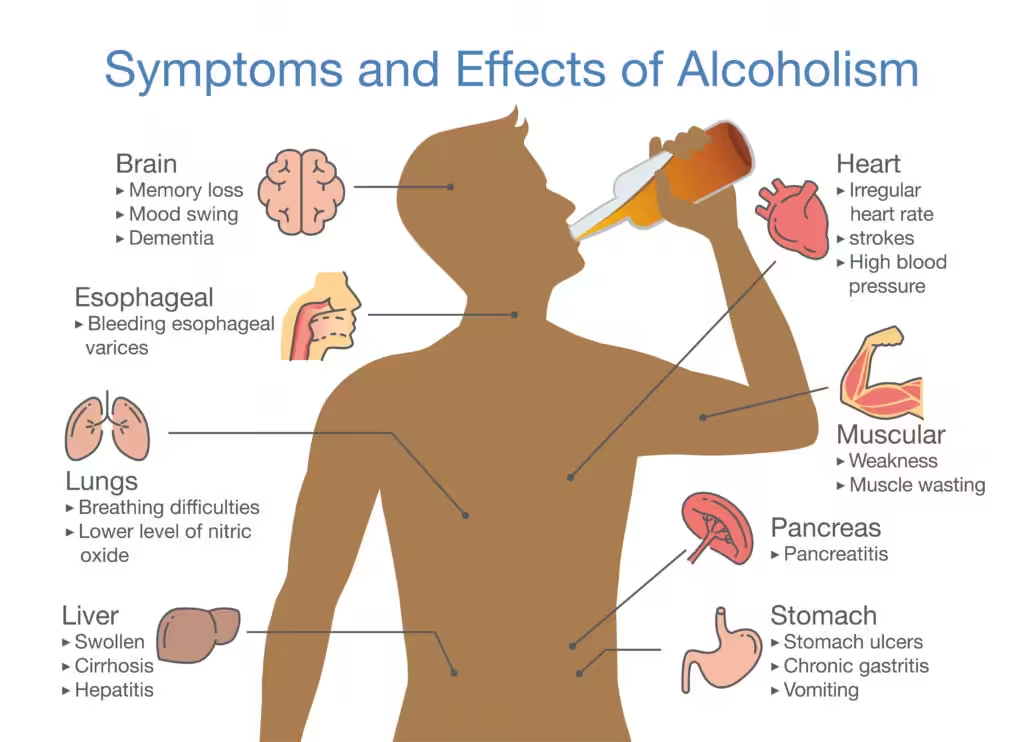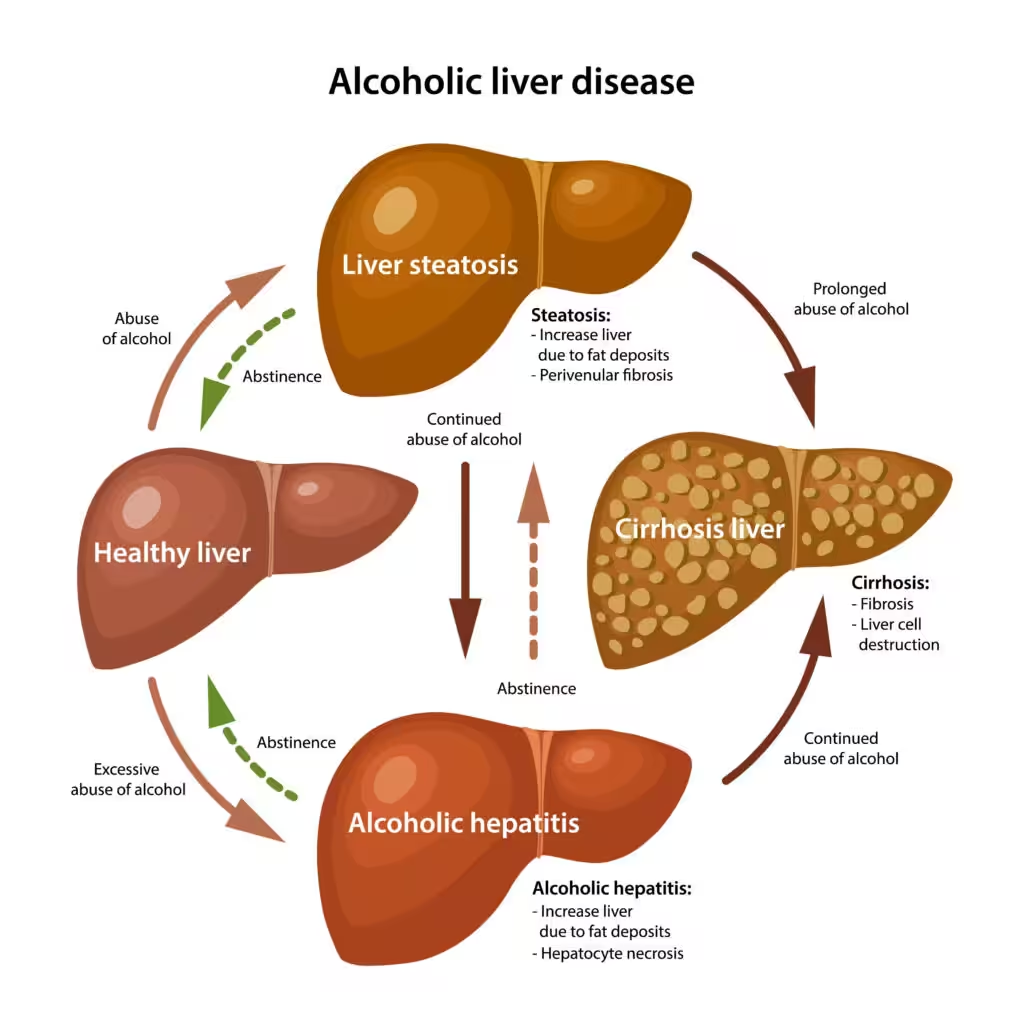What are the effects of drinking alcohol every day?
Drinking alcohol every day, whether that is in the long or short term, is damaging to your physiological well-being. Whether you are drinking a lot of alcohol every day or you have a few pints after work or a few wines with your meal every night, the routine of drinking alcohol every day can cause irreversible damage to your body’s ability to function correctly.
It is worth considering the effects of long and short-term alcoholism on your body and the kinds of interventions and treatments available to help you move away from frequent alcohol use.
Why do people drink every day?
No matter how much we drink or how often, every drip of alcohol that goes into our system has to be processed, and the processing of alcohol is a stressful event for our bodies.
If we drink alcohol frequently, the body will adapt to processing it as best it can, and this could potentially increase our tolerance level, which will demand our intake of alcohol to increase.
In other words, alcohol has complex effects on the body. So much so that if we drank the same amount of alcohol, our bodies would deal with it differently, and the results of our drinking would also be different.
It is the same with drinking every day in the long and the short term, but the consequences differ significantly.
Do alcoholics drink every day?
Most alcoholics who are still drinking drink every day. The urge to drink is too strong, and the side effects of stopping when your body is dependent on alcohol can be uncomfortable and quickly relieved by drinking again.
However, this is not always the case. Some people who are dependent on alcohol but desperate to stop can binge for days or weeks before stopping for some time. As it progresses, the binges will become more frequent and worse.
Equally, some people drink a very small amount of alcohol but drink every day. A small glass of wine in the evening, perhaps, or a beer with dinner is possible through habit rather than alcoholism. It is a good idea, however, to take an occasional break from drinking as it does affect your brain and immune system when taken every single day.
Short-term effects of drinking every day
As mentioned above, the short-term effects of drinking alcohol every day will depend on the body, but one thing is for sure, at the very least, your organs will begin to show signs of damage.
If you start drinking every day, your body will begin to inflame. Inflammation is a build-up of cells that are gathered from the bloodstream to provide healing. So why does the body need to heal? Well, regular consumption of alcohol is damaging, and the process of healing is imperative for survival. It is a reflex of the body.
If you maintain your drinking habits long-term, then the consequences of such a lifestyle will begin to show themselves.

What are the effects of drinking alcohol every day long term?
Part of this process of healing the damage, over and over again, will eventually cause damage to the body. Alcohol is an irritant to the gastrointestinal tract, the central pipe system for digestion.
The ability of the body to protect itself from the frequency of such damage will get harder and harder to do as the body gets older. And with this comes the potential of being unable to identify cancerous cells, enabling them to multiply. But this isn’t the only issue the body has when it comes to drinking alcohol every day long term.
What else happens to the body if I drink alcohol every day long term?
As we have discussed above, the damage caused by long-term alcohol abuse is complex and can bring many health issues that can range from uncomfortable symptoms to mortal danger.
Let’s look at some of the leading causes of concern when it comes to the effects of alcoholism.
Heart
Alcohol dehydrates the body, making it harder for blood to push around the blood needed for regular functioning. If the heart has to work harder to pump around the blood, then this increases blood pressure and the electrical signals necessary to jolt the muscle. These are the ingredients of sudden cardiac death (SCD).
Kidneys
When you drink alcohol, you may notice that you pass urine more often. The reason is that alcohol is a diuretic, which doesn’t bode well for the kidneys. Alcohol dehydrates the body and its ability to function correctly. If a healthy circulatory system does not support the kidneys, it must compensate by filtering a more concentrated solution to fight toxins.
Suppose this process has to be repeated over and over again through long-term alcohol consumption. In that case, the kidney’s ability to function will decline, leaving toxins unchecked to enter the body.

Liver
As with all the other aspects of bodily functions, the liver needs water to help it make metabolic enzymes that help break up any toxins that may pass through the body. Alcohol is a toxin that decreases the chances of being dealt with properly.
If you drink alcohol daily, the liver will develop fibrosis, which is scarring.
The scarring results from constant inflammation that will eventually lead to liver failure.
The psychological effects of long-term alcohol abuse
So far, we have gone through the physical effects of daily drinking, but what about its impact on our mental state? Well, the truth is that the mental and emotional impacts caused by alcohol are less specific.
It is not uncommon for people to have issues with their mental health before they start drinking alcohol; in fact, many will use alcohol to dull the intensity of how they feel day-to-day.
The symptoms of daily alcohol use can make us anti-social, anxious, depressed, panic-stricken, have difficulty sleeping, making us irritable, which then makes us crave more alcohol. It is a vicious cycle that is hard to get into but hard to get out of it.
How can I get help?
At Rehab Guide, we specialise in giving you the help to get out of the cycle of alcoholism by providing you with the support and tools to sustain a life of sobriety.
If you think you or a loved one requires treatment for alcohol addiction, then please do not hesitate to contact our team now. Our staff are available at any time to answer questions or to have a chat about your current situation.
It is free to call us and completely confidential.

Fiona Kennedy is an editor and content manager who earned her Master of Arts degree from the University of Edinburgh, followed by completing the CELTA Cambridge teaching course in English. She has worked as an editor, writer and personal coach. Coming from a family deeply involved in the rehabilitation and support of those suffering from addiction, she is passionate about helping people to understand and take control of their dependences. Fiona’s other passions include travelling and taking part in community projects.


